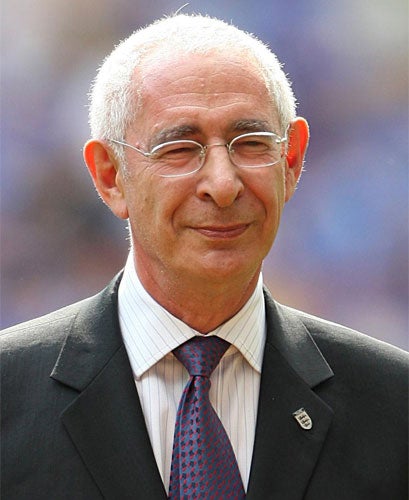The bitter divisions that brought down Watmore
A week which started well for the former FA chief executive ended in resignation as the organisation's endemic power struggles came to the fore again

Ian Watmore's final week as chief executive of the Football Association had seemed to be developing as a fruitful one in his challenging quest to drive down the costs of an organisation full of arcane practices. After a meeting last Wednesday of the full FA Council – the gathering of 140 representatives from all levels of the game – Watmore seemed to have won his case for limiting membership of the labyrinthine system of FA committees to 12 people and restricting their meetings – all held at Wembley – to four a year. It was not all the talk that was the problem but the expenses, with each committee man eligible to claim first-class rail fare to London each time, among other items.
"Watmore upset some people by saying that no individual should sit on more than three committees," said one Council member who was there. "But people got the point about costs. There was even a discussion about not travelling first class unless it was strictly necessary. That was noted." It is tempting to believe that Watmore was a happy man the day before his resignation last Friday, given that another FA group – the National Game Board – had seemed so convinced by another strategy which would drive millions of pounds in costs off the books of the FA, an organisation which turned over £261.8m in the financial year to 31 December 2008 but still ended up with a pre-tax loss of £15.3m.
Watmore wanted to "de-legalise", as he put it, the FA disciplinary system under which the wealthiest clubs hire a QC for some FA disciplinary panels, effectively forcing the FA to follow suit. With some clubs also requesting that a solicitor chairs the hearings, some of the higher profile cases "resemble High Court sessions" according to one FA source who has sat on four-man disciplinary commissions. Watmore proposed cutting away all that to prevent the legal profession from making a tidy income from the disciplinary side of the game. The National Game Board agreed to Watmore's plan last Tuesday. It was a different story on Thursday, when he presented the same ideas to the FA's Professional Game Board, which represents the game's monied classes. Watmore's proposal was rejected out of hand.
For an individual steeped in the corporate culture of management consultancy at Accenture, where ideas once conceived were always driven through rapidly, Watmore's frustration was understandable. It is also clear that he was not a passive individual in the midst of such battles. He wanted his own way. As another FA Council member yesterday said: "He was seen in the chief executive mould of Willie Walsh at British Airways and wants to be in control – when perhaps he wasn't."
That dynamic certainly made encounters with the Professional Game Board and the full FA Board interesting occasions. The contents of the email which Watmore sent to members of the full FA board when correspondence he had sent was leaked on Friday reveal that implacability was not something he always found easy. "There was a lack of patience," said another source.
The view from within the game yesterday was that while the Manchester United chief executive David Gill "got" Watmore's attempts to modernise the corporate side of the game and drive away outdated practices, others did not. Sir Dave Richards, chairman of the Premier League, former Ipswich chairman David Sheepshanks and Barnet chairman Tony Kleanthous were the FA board members who would typically respond with a flat "no" when ideas were put to them, according to some sources. That chimes in with former acting chief David Davies' memorable recollection in today's Independent of how his ideas about independent directors for the FA – later espoused in the Burns Report – were dismissed. "No," the board said.
Someone was also determined to undermine another of Watmore's plans for making the FA more professional – the appointment of a former civil servant Julian Eccles as the new communications director. The leaked email of Watmore's suggested response to media inquiries on the topic reveals that much. Ironically, Eccles' appointment is not an issue for FA grassroots members that many have assumed.
Davies argues today that after five chief executives in little more than a decade, now is the time for an elected executive chairman or president along the Uefa and Fifa model, though the FA seem intent on pursuing another individual for the same post. The task will be to marry business acumen and an ability to persuade less enlightened football people of the way ahead. While Watmore, whose commercial achievements include the development of new online revenue streams and -handling a number of sponsorship deals, provided more dynamism than his predecessor, Brian Barwick, he lacked the personal popularity of Mark Palios, who resigned in August 2004 after the Faria Alam scandal. "Palios was the best CEO in recent years since Graham Kelly," a senior Council member said yesterday. "He had the focused approach and financial skills to sort out the blazers but had come from a career in the game and still played. He had excellent interpersonal skills."
So who might be next? "The FA is a big business these days, not just a big sports organisation," the source continued. "With the power struggle on the main board it needs two or three independent directors. Without that, who on earth would want the job?" Who indeed?
Join our commenting forum
Join thought-provoking conversations, follow other Independent readers and see their replies
Comments
Bookmark popover
Removed from bookmarks